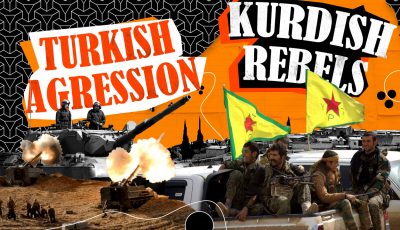Video: Syrian Soldiers Killed in Turkish Strikes in Idlib. Kurdish Rebels Attack Turkish Proxies in Afrin

The Afrin Liberation Forces carried out a series of attacks on Turkish-backed militants in northern Aleppo. According to the group, its fighters stormed positions of Turkish proxies near Omra killing three of them on March 26. On April 1, the group’s members blew up a vehicle of a field commander, Abu Khalid. The commander and his three bodyguards were killed, while the fourth one was injured. On the same day, Kurdish rebels detonated an IED at a headquarters of Turkish-backed forces in the al-Mahmudiyah neighborhood of Afrin city. The attack resulted in material losses only.
The Afrin Liberation Forces is a brand used by the Kurdish People’s Protection Units (YPG) to distance themselves from regular attacks on the Turkish Army and Turkish-backed groups in northern Syria. They launch their attacks from the YPG-controlled area near the city of Aleppo and have a network of cells within the Turkish-occupied region of Afrin.
Turkish convoys with building blocks and engineering equipment were entering Syria through the Kafr Lusin border crossing on April 1 and April 2. Later, the equipment and building blocks then were delivered to the militant-held part of the M4 highway in southern Idlib. The Turkish military is reportedly planning to use them to set up a group of fortified checkpoints along the highway in order to solidify its presence there. In March, Turkish forces in the area became a target of two IED attacks by radical militants, and Ankara reasonably expects that such attacks could continue in April.
On April 2, two Syrian soldiers were killed and five others were injured in a Turkish artillery strike on a Syrian Army checkpoint near the town of Tell Tamr in the province of al-Hasakah. In 2019, the army established a number of positions in northeastern Syria following a breakthrough agreement with local Kurdish militias. Then, joint Syrian-Russian efforts allowed to limit the Turkish military operation against Kurdish forces and prevent a larger escalation. Nonetheless, sporadic firefights and artillery duels regularly erupt on the contact line between the Turkish Army and its proxies on the one hand and the Syrian Army and Kurdish militias on the other hand.
Meanwhile, the US-led coalition reinforced its military base in the oil-rich area of Rmelan. The US base is located near one of the country’s largest oil fields. It can produce up to 90,000 barrels a day. Earlier, the US military deployed additional equipment and troops to its positions in the area of al-Shaddadi in southern al-Hasakah.
According to the Pentagon, about 500 US troops remain deployed in the oil-rich areas in the provinces of Deir Ezzor and al-Haskah. However, the scale of military activity in the region indicate that the real number of personnel involved is likely higher.
*
Note to readers: please click the share buttons above or below. Forward this article to your email lists. Crosspost on your blog site, internet forums. etc.
Support South Front in its endeavors. If you’re able, and if you like our content and approach, please support the project. Our work wouldn’t be possible without your help: PayPal: [email protected] or via: http://southfront.org/donate/ or via: https://www.patreon.com/southfront

